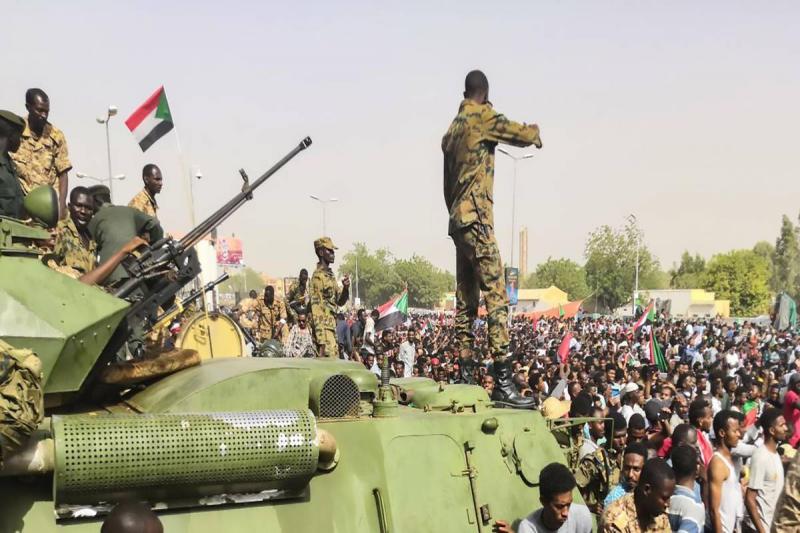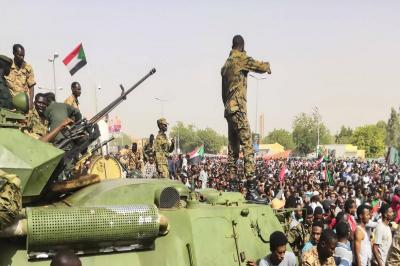After both parties in the Sudan conflict agreed to a 72-hour ceasefire starting today, Tuesday, as Western, Arab, and Asian nations race to evacuate their nationals from the country, the Rapid Support Forces accused the Sudanese army of failing to adhere to the ceasefire conditions. Meanwhile, the Sudanese Foreign Ministry stated that "the Rapid Support Forces continue to target diplomatic missions."
The Sudanese Foreign Ministry reiterated the state's commitment to the humanitarian ceasefire and cessation of hostilities, warning against "exploiting our goodwill for the spread of rebel forces and committing more killings and violations." It condemned "the destructive behavior of Rapid Support Forces groups and their ongoing targeting of diplomatic missions." In contrast, the Rapid Support Forces claimed that "the Sudanese army has not complied with the ceasefire conditions, as its aircraft continue to fly over Khartoum, indicating the presence of more than one decision-making center within the armed forces' leadership." They renewed their commitment to the ceasefire, noting that "the flights of army aircraft represent a breach of it."
The Rapid Support Forces stated that "indiscriminate artillery shelling endangers the lives of citizens and residents from foreign nations and hampers the ceasefire," adding that "the killing of the Egyptian diplomat is the responsibility of the Sudanese army and Islamists, and it is a failed attempt to drive a wedge between us and Egypt."
The Sudanese army clarified that "the United States and Saudi Arabia mediated the ceasefire." U.S. Secretary of State Antony Blinken initially announced the agreement, stating it came after two days of intense negotiations. The two parties had not adhered to several previous temporary ceasefire agreements. Blinken urged both the Sudanese armed forces and Rapid Support Forces to commit to an immediate and complete ceasefire during this period.
He added that "the United States will coordinate with regional and international partners and relevant Sudanese civilians to form a committee overseeing efforts to reach a permanent ceasefire and establish humanitarian arrangements." The Rapid Support Forces confirmed their agreement to the ceasefire starting at midnight to facilitate humanitarian efforts, stating, "We reaffirm our commitment during the declared ceasefire period to a complete cessation of hostilities." The Sudanese army announced on its Facebook page that it had also agreed to the ceasefire.
A coalition of Sudanese civil society organizations welcomed the news of the ceasefire, especially as they had participated in negotiations to transition the country to democracy. Before the ceasefire announcement, reports indicated that the city of Omdurman had suffered airstrikes and experienced ongoing ground fighting, with clashes reported in the capital, Khartoum. Thick black smoke rose into the sky near the international airport in central Khartoum, close to the general command of the army, accompanied by the sounds of artillery fire.
The number of civilian fatalities has risen to 291, according to the Sudanese Doctors' Syndicate, with injuries totaling 1,699. They noted that "71% of the hospitals adjacent to the areas of ongoing clashes are out of service." In their statement, they revealed that "13 hospitals were bombed during the clashes, and 19 hospitals faced forced evacuations." The UN Office for the Coordination of Humanitarian Affairs had to reduce its presence in areas affected by intense fighting in Sudan.
Furthermore, the World Health Organization representative in Sudan, Naima Saeed Abed, highlighted a "significant biological risk" following one party’s control of a laboratory. Speaking to journalists in Geneva via video link, Abed reported that at least 459 people had been killed in the fighting, with 4,072 injured.
Fighting erupted between the Sudanese army and the Rapid Support Forces on April 15, leading to at least 427 deaths, the shutdown of hospitals, disruption of other services, and residential areas turning into war zones. UN Secretary-General Antonio Guterres deemed the "violence between the warring factions a warning of a catastrophic escalation of war in Sudan that could extend throughout the region and beyond." The Security Council plans to hold a meeting regarding Sudan today, Tuesday.




